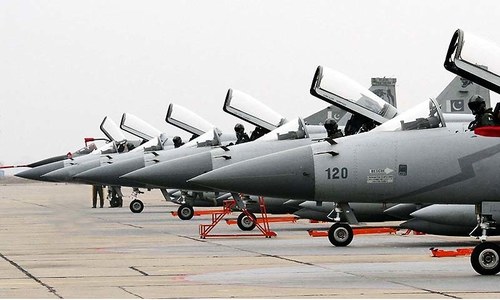THE National Command Authority, the apex nuclear body in the country, met on Wednesday and, among now-standard reiterations, “re-emphasised Pakistan’s desire for establishing the Strategic Restraint Regime in South Asia and the inescapable need of a meaningful and sustained comprehensive dialogue process for resolution of all outstanding disputes”.
In a week in which it was revealed that Pakistan and India are among the top 10 importers of arms globally, the NCA’s message was sensible and welcome.
The Strategic Restraint Regime (SRR) was first mooted by Pakistan in the wake of the 1998 nuclear tests in South Asia and is based on nuclear restraint, conventional balance and dispute settlement. In theory, SRR would eliminate the possibility of an arms race and, via dispute settlement, rationalise the investments in their militaries that India and Pakistan have deemed necessary. In reality, India has never been interested in SRR. Why?
Security hawks in Pakistan would point to India’s unbridled ambitions and its desire to project military power over its neighbours. The massive investments that India has made and is continuing to make to transform its military capabilities do suggest that ambition more than pure threat perception is driving India’s defence strategy.
An economy that is still growing at more than seven per cent per annum has created the fiscal space for India’s policymakers to pursue fanciful projects. Yet, there is another side to the story. The SRR is a bilateral pact, whereas India is locked in a rivalry with China too.
The Chinese military budget, at an estimated $150bn, is three times the size of India’s. The cascading security effect between China, India and Pakistan — and the global ambitions of China and India — have made the SRR a non-starter. But it need not be.
The elements of SRR — nuclear restraint, conventional balance and dispute settlement — are interlocking. For example, it was India’s consideration of Cold Start, a next-generation conventional capability, that triggered Pakistan’s interest in tactical nuclear weapons.
Cold Start was Pakistan-specific and had little relevance to China, suggesting that if India had shown restraint in its public posturing, the Pak-India nuclear threshold would not have been altered.
There is also a third aspect, as the NCA statement made clear: “a meaningful and sustained comprehensive dialogue process”. For all the rhetoric and occasional bellicosity, Indian and Pakistani policymakers are ultimately rational actors.
As long as there are outstanding disputes of a serious nature, the threat of conflict is a real one — and defence strategies and spending will reflect that reality. Resolve those disputes, however, and a rationalisation will eventually and necessarily take place. To assert that is not woolly optimism.
Dialogue may not yield immediate or significant breakthroughs, but that is why it needs to be meaningful and sustained. The NCA statement suggests that the military is supportive of comprehensive dialogue. India should meet Pakistan half way.
Published in Dawn, February 27th, 2016

















































